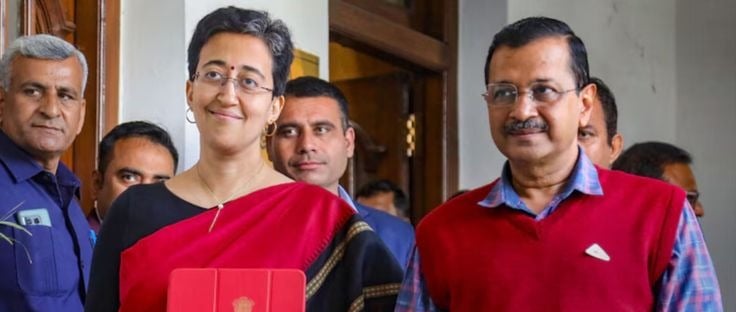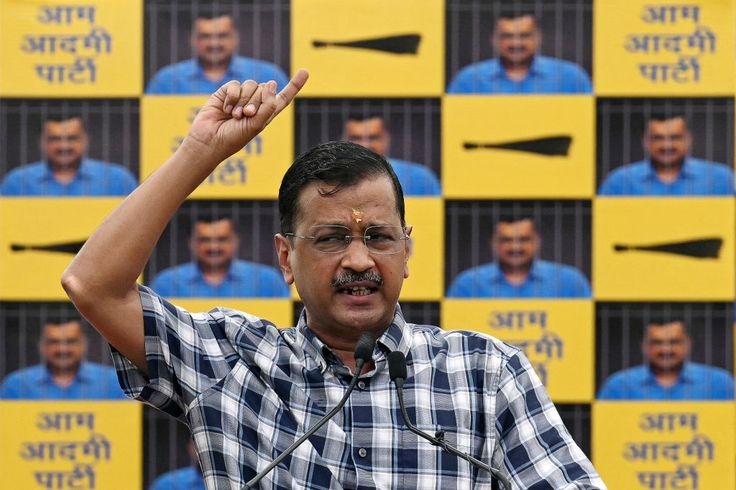AAP manifesto 2025- will win ?
As Delhi elections 2025 approach, it's crucial to examine the Aam Aadmi Party's (AAP) record—a government that promised revolutionary changes but left Delhi grappling with poor governance, fiscal mismanagement, and cultural disregard.
POLITICS
1/19/20254 min read


AAP’s Governance Model: A Mirage of Promises and the Cost of Freebie Politics
As Delhi elections 2025 approach, it's crucial to examine the Aam Aadmi Party's (AAP) record—a government that promised revolutionary changes but left Delhi grappling with poor governance, fiscal mismanagement, and cultural disregard. This article uncovers AAP's failures while highlighting BJP’s focus on long-term development, economic growth, and cultural preservation.
Education System Overshadowed by Propaganda
AAP’s much-touted Delhi education reforms appear hollow when examined closely. Reports indicate that many Delhi government schools still lack basic hygiene, proper infrastructure, and qualified teaching staff. A Comptroller and Auditor General (CAG) report revealed that less than 50% of Delhi’s schools meet basic safety standards. The tragic incident in Nangloi, where a student died due to electrocution in a waterlogged school compound, epitomizes this failure.
Parents consistently report dissatisfaction due to a lack of qualified teachers, unsafe school environments, and an overemphasis on superficial changes like painted walls and new benches. Even the so-called increase in enrollment is deceptive, with many students dropping out later due to poor teaching quality. If AAP’s education revolution were genuine, why do these fundamental issues persist?
Healthcare Revolution That Failed to Heal
The Mohalla Clinics in Delhi, often paraded as AAP’s flagship reform, have become a symbol of overpromising and underdelivering. While these clinics were supposed to provide primary healthcare for the poor, they now face serious allegations of fake medical testing and corruption. Over 65,000 fake medical test results were fabricated, leaving many citizens like Kavita Sharma, who trusted these clinics, in grave danger.
Reports suggest that several clinics remain non-functional or lack basic equipment and medicines. Patients visiting these clinics often complain of unavailability of doctors and substandard medicines. Despite the much-touted healthcare "revolution," Delhi remains heavily reliant on central schemes like Ayushman Bharat, which AAP has failed to implement effectively.
Furthermore, despite the lofty claims of bringing healthcare to the doorstep of Delhi’s poorest, the outreach of these clinics is shockingly limited. Many neighborhoods, especially in outer Delhi, still lack access to basic medical facilities. A healthcare system built on fragile foundations cannot sustain the weight of public expectations.
Public Transport: Promises Lost in Transit
Public transport is critical to urban mobility, but AAP’s performance in this sector has been abysmal. Delhi currently operates with fewer than 7,000 public buses, far below the requirement of 11,000. AAP promised new additions to the fleet but failed to deliver, leaving millions dependent on overcrowded, outdated buses.
Commuters like Ramesh Singh, a daily wage worker, struggle with delayed and overcrowded buses, often leading to wage losses. College students, too, face disruptions in attending classes, impacting their education. This lack of efficient public transport has forced residents to rely on private vehicles, exacerbating Delhi’s pollution crisis, which remains among the world’s worst.
Delhi’s deteriorating public transport infrastructure has not only hindered mobility but has also directly impacted livelihoods and education. Meanwhile, AAP’s promises to improve metro connectivity and add new buses remain unfulfilled, betraying the trust of the very people they claim to represent.
The Cost of Freebie Politics
AAP’s reliance on populist freebie politics has caused long-term damage to Delhi’s economy. While free water, electricity subsidies, and free bus rides sound appealing, they come at the cost of fiscal discipline and infrastructure development.
1. Ballooning Fiscal Deficit:
Under AAP, Delhi’s fiscal deficit has surged, with the state’s debt-to-GDP ratio worsening each year. Resources that should have been invested in essential sectors like infrastructure, sanitation, and public health have been diverted toward unsustainable subsidies.
2. Neglect of Capital Investment:
With infrastructure projects stalled, Delhi’s roads, bridges, and sewage systems are crumbling. Even basic urban amenities remain neglected, impacting quality of life and long-term growth.
3. Dependency Culture:
By fostering a dependency culture through freebies, AAP discourages self-reliance and entrepreneurship. In contrast, central government schemes like Atmanirbhar Bharat aim to create self-sufficient citizens and businesses.
AAP’s Insult to Hindu Culture
AAP has also alienated significant portions of the population with its disregard for Hindu sentiments.
1. Disrespect for Hindu Festivals:
AAP’s restrictions on Diwali celebrations under the pretext of pollution control have caused widespread resentment. Meanwhile, the government remains silent on environmental damage caused during other festivals, leading to accusations of bias.
2. Alignment with Anti-Hindu Elements:
During the Delhi riots 2020, AAP’s lack of action and its association with groups accused of propagating anti-Hindu narratives raised serious concerns. Many victims of the riots were Hindus, yet the government chose selective outrage rather than addressing the crisis equitably.
3. Mockery of Sanatana Dharma:
AAP leaders have trivialized Hindu traditions, from questioning the Ram Mandir donations to dismissing ancient practices. This deliberate undermining of cultural values has alienated a large section of Hindu voters.
BJP: A Vision for Long-Term Development
In stark contrast, the BJP-led central government has demonstrated a commitment to inclusive growth, infrastructure development, and cultural preservation.
1. Pro-Poor Policies:
Flagship initiatives like Ayushman Bharat, PM Awas Yojana, and Jan Dhan Yojana have uplifted millions, ensuring that welfare reaches the grassroots. Unlike AAP’s freebies, these schemes encourage empowerment rather than dependency.
2. Infrastructure Investments:
BJP’s projects, such as the Eastern and Western Peripheral Expressways, have eased traffic congestion and reduced pollution in Delhi. Major investments in railways and metro expansions reflect a commitment to long-term urban planning.
3. Preservation of Cultural Heritage:
The BJP has consistently upheld India’s cultural ethos through initiatives like the grand Ram Mandir in Ayodhya. Unlike AAP, which trivializes Hindu traditions, BJP celebrates and protects India’s rich heritage.
Governance that Prioritizes Headlines Over Results
AAP’s governance model is built on headlines, advertisements, and a carefully crafted image of reform. However, the reality is far removed from their promises. Education reforms are superficial, healthcare initiatives are plagued by inefficiency and corruption, and public transport infrastructure is in shambles.
These failures have real, tangible consequences for the people of Delhi—be it children deprived of quality education, patients left untreated, or workers struggling to make ends meet due to inadequate transport.
As Delhi approaches the 2025 elections, it is time for voters to demand accountability. Governance cannot be reduced to free handouts and flashy campaigns. Delhi needs leadership that prioritizes sustainable development, transparent governance, and long-term solutions over populism.
Conclusion: Delhi Deserves Better Leadership
As Delhi gears up for the 2025 elections, the contrast between AAP’s populist, short-term governance and BJP’s long-term vision could not be clearer. AAP’s broken promises, economic mismanagement, and disregard for cultural values have left Delhi struggling. On the other hand, BJP’s policies focus on sustainable development, empowering the poor, and respecting India’s cultural identity.
It’s time for Delhi to move beyond the lure of freebies and choose a government that truly prioritizes its people and future. The upcoming elections will determine whether Delhi continues down a path of fiscal irresponsibility or embraces growth and stability under visionary leadership.

